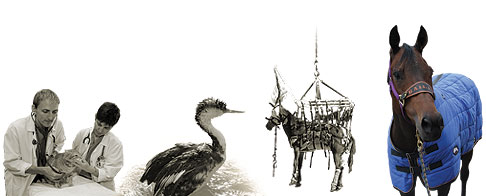
UC Davis veterinary researchers have improved companion-animal health by identifying a taurine deficiency in commercial pet food and by identifying the toxic ingredients in recalled pet food in 2007.
Disease management
Throughout the past century, School of Veterinary Medicine researchers have helped identify, diagnose, treat and even eradicate numerous animal diseases in the United States and the world. Bluetongue virus, a disease that once devastated sheep flocks and cost the livestock industry millions of dollars, was eradicated in much of the nation thanks to UC Davis research that produced a diagnostic test and vaccine in the early 1960s. Such pioneering research, coupled with modern genetic advances, has led to safer, more effective vaccines for ailments such as rinderpest—a measles-like cattle plague that has caused famine and economic devastation in Africa. Researchers at the International Laboratory of Molecular Biology for Tropical Diseases also produced an inexpensive diagnostic kit simple enough to be used in the field.
In addition to safeguarding the health of livestock and wild animals, UC Davis has also improved the health and survival of companion animals. Researchers developed a vaccine for feline leukemia and drew a correlation between a lack of dietary taurine, an amino acid, and feline dilated cardiomyopathy, a fatal heart ailment. Pet food companies recognized the importance of the discovery and began adding taurine to commercial cat food, saving the lives of untold numbers of pets.
